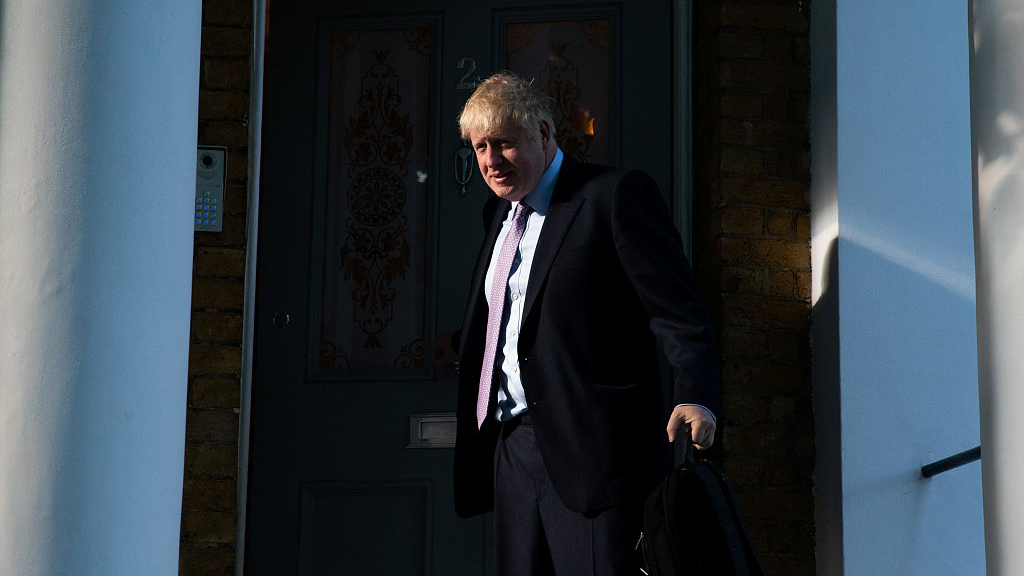
Former London Mayor and UK Foreign Secretary Boris Johnson. (Photo: VCG)
With Boris Johnson seemingly miles ahead of Jeremy Hunt in the race to become the next leader of the UK's governing Conservative Party – and, therefore, Prime Minister – many have pointed to his character flaws and personal scandals as the only areas that could trip him up.
Were one or many scandals to emerge during the contest, this could potentially derail Johnson's chances, it has been suggested. And, within moments of the final round of the contest beginning, the first scandal has already emerged. Has it harmed Johnson's chances of victory, or will Conservative Party members – the narrow "selectorate" in this contest – shrug it off as unimportant?
As initially reported by The Guardian newspaper, in the early hours of Saturday morning police were called by concerned neighbors to attend the flat in south London that Boris Johnson is currently living in with his partner Carrie Symonds. Johnson's former main home is occupied by his estranged second wife, and it has been suggested that, were he to become Prime Minister, he and Symonds would occupy Number 10 Downing Street together.
The neighbors are understood to have alerted the police to disturbing loud noises and shouting coming from the flat, including Symonds shouting for someone to get off her and to get out of her flat. While such accusations could be spurious, the neighbors made an audio recording of the incident which The Guardian has apparently confirmed.
Other neighbors also confirmed the story, with the alleged domestic dispute being audible throughout the street. Police, however, confirmed that all occupants were safe and well when they attended, and stated that there was no domestic violence incident to report.
Some have claimed that an incident such as this should be firmly treated as an element of Johnson's private life which has no relevance to his day job. They argue that all couples have arguments – many of which the participants would not want to be aired in public – and that it is unfair to Johnson and, particularly, Symonds to draw attention to their private lives so publicly.
On the other hand, Johnson is currently trying to become Prime Minister of his country; to do the most important job in public office. There is a strong argument that the public have a right to know about the characteristics of their leaders, and understanding such characteristics often requires understanding how they behave in private.
For example, many have accused Johnson of being too irresponsible to become Prime Minister. To give one oft-cited example, during his time as Foreign Secretary, he mistakenly claimed that the British-Iranian citizen currently jailed in Iran – Nazanin Zaghari-Ratcliffe – was in the country to train journalists. This was incorrect and is thought to have contributed to the extension of her prison sentence in Iran.
While one might not see a clear link between this and Johnson's private life, he has a history of acting irresponsibly and with poor judgment in this sphere as well. No one knows exactly how many children Johnson has as a result of multiple alleged affairs, for example. While this is part of his personal life, it is suggestive of personality traits which some members of the public might legitimately refuse to countenance in their Prime Minister.
The fact is, however, that Johnson is immensely popular among Conservative Party members, and – while the bookmakers initially lowered his chances of winning the contest after this domestic incident – they quickly reversed this.
Johnson was interviewed by Iain Dale at the first leadership hustings to be held around the country on Saturday afternoon, and he refused to answer any questions about what happened. The audience of party members cheered Johnson's refusal, and booed Dale for continuing to persist in seeking an answer.
This is indicative of the extent to which many party members have no interest in such stories or, at least, do not see them as of value in their decision-making process. It seems at this point, therefore, that even if such scandals continue to emerge, it will be difficult to trip Johnson up completely.
We do not know what may lie ahead in the coming weeks, but it appears that something rather more substantial will be necessary to stop Johnson becoming Prime Minister. That is, of course, until he has to participate in his first general election. It may be that scandals such as this, while not upsetting Conservative Party members a great deal, may make Johnson toxic enough with the public that he does not last long as the UK's leader.


